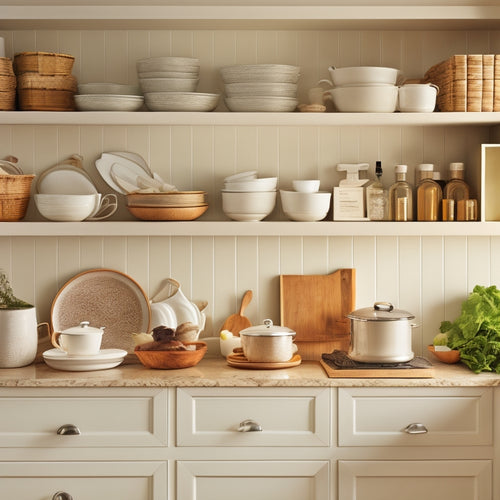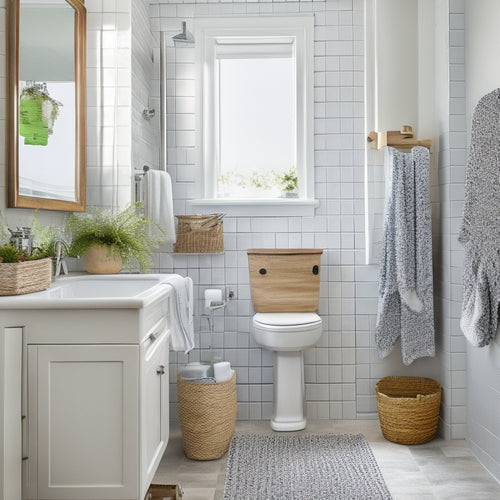
Pre-Storage Decisions: Simplify With Strategic Assessment
Share
You're taking a critical step in simplifying your storage process by recognizing the importance of strategic pre-storage assessment, which can save you time, money, and frustration in the long run. Before storing, you'll want to assess what you really need to keep, decluttering items that no longer serve a purpose. Implement a strategic organization system, utilizing vertical and horizontal space efficiently, and prioritize frequently used items for easy access. Additionally, thoroughly clean each item before storage, and evaluate stored items for functionality and suitability. By doing so, you'll set yourself up for success - and discover even more ways to optimize your storage strategy.
Key Takeaways
• Conduct a thorough pre-storage assessment to avoid emotional attachment to unnecessary items and optimize storage space.
• Implement decluttering tips like evaluating item usage and set limits on storing others' belongings to streamline storage.
• Prioritize items with emotional significance and consider letting go of items that no longer serve a purpose or bring joy.
• Evaluate stored items for functionality and suitability, determining item necessity and usability to simplify storage.
• Consider location proximity, climate control, and security features when selecting the right storage facility for your needs.
Pre-Storage Assessment Essentials
Before storing your belongings, take a step back and conduct a thorough pre-storage assessment to determine what's truly worth keeping, ensuring you're not cluttering your storage space with unnecessary items.
This essential step helps you avoid emotional attachment to items that no longer serve a purpose. Implement decluttering tips like asking yourself when you last used an item or if it still aligns with your current style. Be honest – if you haven't used it in a year, it's probably safe to let it go.
Set limits on storing others' belongings and prioritize items with emotional significance. By doing so, you'll preserve memories while keeping your storage space organized and clutter-free. This assessment will save you time, money, and stress in the long run.
Optimizing Storage Organization
Your carefully curated storage space relies on a strategic organization system that keeps like items together, utilizing vertical and horizontal space, and prioritizing frequently used items for easy access.
This means implementing a container organization system that maximizes space efficiency, allowing you to store more without overcrowding. Consider seasonal accessibility, storing winter gear in labeled containers during summer and vice versa.
By categorizing and grouping similar items, you'll reduce clutter and make maintenance a breeze. Remember to label and organize items in a way that makes sense to you, so you can quickly find what you need.
With a well-organized storage space, you'll save time, reduce stress, and enjoy the peace of mind that comes with knowing exactly where everything is.
Item Maintenance and Care
Cleanliness is crucial when it comes to storing items, so take the time to thoroughly clean each item before placing it in storage to prevent dirt and grime from causing damage or deterioration.
You'll want to use gentle cleaning techniques to avoid scratching or damaging surfaces. For preventive measures, consider applying a protective coating or wrapping items in cloth or paper to shield them from the elements.
If you've got damaged items, don't store them just yet! Take the time to repair them first, and inspect them carefully for any signs of wear or tear.
Evaluating Functionality and Suitability
What purpose do your stored items serve, and are they still functional or suitable for their intended use? It's time to get real about the stuff you're holding onto.
Evaluating item usability and determining item necessity is essential in this pre-storage appraisal phase. Be honest with yourself - are those old college textbooks still serving a purpose, or are they just collecting dust?
Take a closer look at each item and ask yourself if it's still functional, still useful, or still brings you joy. If the answer is no, it might be time to let it go.
Selecting the Right Storage Facility
When searching for a storage facility, you'll want to take into account several key factors to make sure you're getting the right fit for your needs.
Location is vital, so consider the proximity to your home and the safety of the area. Climate-controlled options, accessibility, and insurance choices are also essential.
Don't forget to conduct a cost analysis, factoring in prices among facilities, hidden fees, and contract terms. Read reviews and assess the facility's security features, such as surveillance cameras, on-site personnel, and individual unit alarms.
Storage Unit Considerations and Needs
You'll need to carefully assess your storage unit needs by considering the size, features, and amenities that will best accommodate your stored items and future requirements.
Think about the unit size: do you know the exact dimensions needed? Have you considered future storage needs? Is the unit size configurable?
Climate control is another vital aspect to ponder. Is it necessary for your stored items? Are there temperature fluctuations you need to mitigate? Can you adjust climate settings to suit your needs?
Planning and Reviewing Storage Strategy
By developing a thorough storage strategy, you can guarantee that your stored items remain relevant, accessible, and protected, while also adapting to changing needs and circumstances over time.
This involves future planning, where you consider potential changes in your living situation, lifestyle, or personal preferences.
You'll want to regularly review your stored items to confirm they still serve a purpose and aren't just collecting dust.
Don't forget to reassess your security measures, like surveillance cameras and on-site personnel, to make sure your belongings are safe.
Frequently Asked Questions
Can I Store Hazardous Materials in a Storage Unit?
You think you can just stash those hazardous materials in a storage unit, no big deal? Think again! You can't just dump chemicals together like they're old college buddies.
Chemical Classification and Material Segregation are essential. Most storage facilities have strict policies against storing hazardous materials, and for good reason. You'll need to check with the facility beforehand, and even then, it's unlikely they'll give you the green light.
Better find an alternative, or risk getting burned - literally!
How Do I Handle Storage of Sensitive Electronics?
When storing sensitive electronics, you're wise to take extra precautions. First, guarantee electronic shielding by wrapping items in anti-static bags or bubble wrap to prevent damage from electromagnetic interference.
Next, opt for climate-controlled storage units to maintain a consistent temperature between 60-70°F (15-21°C) and humidity levels below 60%. This will safeguard your devices from moisture and extreme temperatures, keeping them in top condition.
What Are the Rules for Storing Firearms and Ammunition?
When storing firearms and ammunition, prioritize Gun Safety and Ammo Organization. Separate firearms from ammo, and keep them in designated, secure areas. Use protective cases and containers to prevent damage and unauthorized access.
Guarantee ammo is stored in a cool, dry place, away from direct sunlight. Label and organize your collection, and regularly check expiration dates. Remember, safety is no joke, so take your storage seriously – your life depends on it!
Can I Store Perishable Food Items in a Storage Unit?
Can you store perishable food items in a storage unit?
The short answer is, it's not a good idea. Food safety is paramount, and storage units often lack the necessary temperature control to prevent spoilage and contamination.
Without proper refrigeration, perishables can become a breeding ground for bacteria, putting you and others at risk.
It's better to explore alternative solutions, like a climate-controlled facility or a friend's spare fridge, to keep your grub fresh and safe.
Are There Any Restrictions on Storing Musical Instruments?
Before storing your prized musical instruments, you'll want to check with the facility about any restrictions. Some may have specific guidelines for sensitive items like instruments, so don't assume they're all good to go.
Ask about climate control options to make sure your instruments stay in tune, and inquire about instrument insurance coverage - you wouldn't want your Stradivarius to get damaged without a safety net!
Related Posts
-

Why Kitchen Cabinet Organization Matters Most
You're likely losing more than just time and ingredients when you can't find what you need in your kitchen cabinets -...
-

Bathroom Storage Hacks for Small Spaces Revealed
You're about to discover the ultimate bathroom storage hacks for your small space! Start by maximizing your vertical ...

